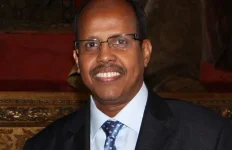The African Union and the United Nations are raising alarms about South Sudan's First Vice President, Dr. Riek Machar, being detained. Both organizations want immediate calm, national talks, and everyone sticking with the existing peace deal instead of fighting each other again.
Mahmoud Ali Youssouf from the African Union expressed deep worries today about Machar's arrest. He reminded everyone that the peace agreement called R-ARCSS remains essential for keeping South Sudan stable and helping its people heal from past conflicts.
The African Union believes all groups must reduce tensions and respect their agreements. Their main goal is to ensure that conditions exist for lasting peace to grow and for the country to develop normally without more bloodshed.
They asked all parties to stay extremely cautious, avoid actions that might spark new problems, and resolve disagreements through peaceful legal channels instead of violence. A special team called the AU Panel of the Wise will soon head to Juba to help facilitate discussions and prevent things from spiraling out of control.
Officials confirmed Machar was taken into custody on March 26, sparking fears the nation could plunge back into civil war. According to his party's statement, shared by foreign relations chief Reath Muoch Tang, twenty heavily armed vehicles stormed Machar's home, disarmed his security detail, and took him away without explaining any charges.
His party strongly condemned these actions by the Defense Minister and National Security Chief as completely unconstitutional. The United Nations Mission quickly warned that South Sudan stands dangerously close to returning to widespread armed conflict after years of fragile peace.
Nicholas Haysom, representing the UN Secretary-General there, cautioned that changing peace agreements without consent risks destroying seven years of progress and could restart devastating warfare. Clashes have already erupted between government forces and Machar's troops around areas named Rejaf and Wunaliet.
Reports indicate serious battles, including aerial bombardments across Upper Nile State. UN officials worry about explosive weapons hitting civilian areas and causing significant casualties. Both international organizations are working alongside regional partners trying to contain this rapidly developing crisis.
The African Union emphasized that protecting ordinary citizens must come first, and following the existing peace framework remains the only realistic path forward. The 2018 agreement between President Salva Kiir and Machar had ended a devastating five-year civil war that killed 400,000 people and displaced millions from their homes.
But their power-sharing arrangement gradually deteriorated throughout recent months. Trust between leadership factions eroded, military confrontations increased, and external countries became involved in various ways. Uganda recently deployed troops into South Sudan under an operation called Mlinzi wa Kimya.
South Sudan previously accused Sudan of backing Machar, adding complicated regional dimensions to an already dangerous situation. The country faces multiple crises simultaneously on political and security fronts, with increasing international calls for intervention before violence spreads further.
Haysom urged both the President and First Vice President to prevent further armed confrontation by meeting directly to resolve differences and issuing a joint public statement. The African Union echoed this sentiment, pushing for renewed commitment to dialogue, cooperation, and human rights as fundamental elements needed for building lasting peace.
Mahmoud Ali Youssouf from the African Union expressed deep worries today about Machar's arrest. He reminded everyone that the peace agreement called R-ARCSS remains essential for keeping South Sudan stable and helping its people heal from past conflicts.
The African Union believes all groups must reduce tensions and respect their agreements. Their main goal is to ensure that conditions exist for lasting peace to grow and for the country to develop normally without more bloodshed.
They asked all parties to stay extremely cautious, avoid actions that might spark new problems, and resolve disagreements through peaceful legal channels instead of violence. A special team called the AU Panel of the Wise will soon head to Juba to help facilitate discussions and prevent things from spiraling out of control.
Officials confirmed Machar was taken into custody on March 26, sparking fears the nation could plunge back into civil war. According to his party's statement, shared by foreign relations chief Reath Muoch Tang, twenty heavily armed vehicles stormed Machar's home, disarmed his security detail, and took him away without explaining any charges.
His party strongly condemned these actions by the Defense Minister and National Security Chief as completely unconstitutional. The United Nations Mission quickly warned that South Sudan stands dangerously close to returning to widespread armed conflict after years of fragile peace.
Nicholas Haysom, representing the UN Secretary-General there, cautioned that changing peace agreements without consent risks destroying seven years of progress and could restart devastating warfare. Clashes have already erupted between government forces and Machar's troops around areas named Rejaf and Wunaliet.
Reports indicate serious battles, including aerial bombardments across Upper Nile State. UN officials worry about explosive weapons hitting civilian areas and causing significant casualties. Both international organizations are working alongside regional partners trying to contain this rapidly developing crisis.
The African Union emphasized that protecting ordinary citizens must come first, and following the existing peace framework remains the only realistic path forward. The 2018 agreement between President Salva Kiir and Machar had ended a devastating five-year civil war that killed 400,000 people and displaced millions from their homes.
But their power-sharing arrangement gradually deteriorated throughout recent months. Trust between leadership factions eroded, military confrontations increased, and external countries became involved in various ways. Uganda recently deployed troops into South Sudan under an operation called Mlinzi wa Kimya.
South Sudan previously accused Sudan of backing Machar, adding complicated regional dimensions to an already dangerous situation. The country faces multiple crises simultaneously on political and security fronts, with increasing international calls for intervention before violence spreads further.
Haysom urged both the President and First Vice President to prevent further armed confrontation by meeting directly to resolve differences and issuing a joint public statement. The African Union echoed this sentiment, pushing for renewed commitment to dialogue, cooperation, and human rights as fundamental elements needed for building lasting peace.












